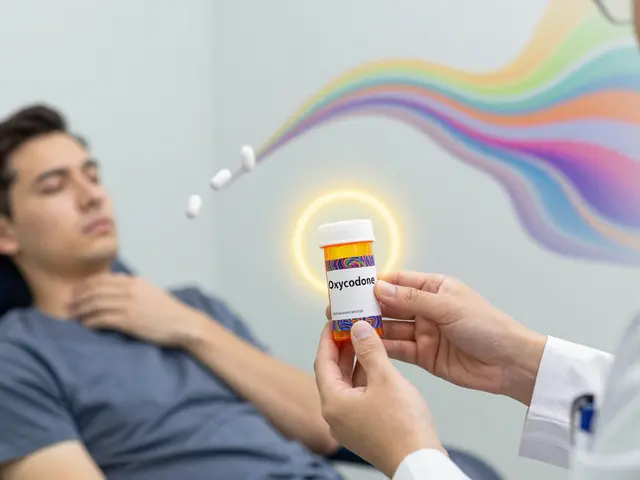
Antidepressant medication is a type of prescription drug designed to alleviate the emotional and physical symptoms of major depressive disorder by altering brain chemistry. When a clinician decides that therapy alone isn’t enough, medication often becomes the next step. This article walks you through why meds matter, the choices on the market, and how to use them safely alongside other treatments.
What Is Major Depressive Disorder?
Major depressive disorder (MDD) is a mood condition marked by persistent sadness, loss of interest, and a range of physical symptoms such as fatigue, sleep disturbances, and appetite changes. The World Health Organization estimates that more than 264million people worldwide experience MDD each year. Without treatment, the risk of chronic disability, substance misuse, and suicide rises sharply.
How Medications Influence Brain Chemistry
At the core of most antidepressants is the goal to restore balance among key neurotransmitters - the chemical messengers that transmit signals between nerve cells. The most relevant ones for depression are serotonin, norepinephrine, and dopamine. By blocking reuptake or inhibiting breakdown, antidepressants increase the availability of these chemicals, which in turn improves mood regulation, motivation, and cognitive function.
Main Classes of Antidepressants
There are several drug families, each with a distinct mechanism, effectiveness profile, and side‑effect pattern. Below is a quick comparison to help you see the differences.
| Class | Typical Examples | Primary Mechanism | Onset of Action | Common Side Effects |
|---|---|---|---|---|
| Selective serotonin reuptake inhibitors (SSRIs) | Fluoxetine, Sertraline, Citalopram | Blocks serotonin reuptake | 2-4 weeks | Nausea, sexual dysfunction, insomnia |
| Serotonin‑norepinephrine reuptake inhibitors (SNRIs) | Venlafaxine, Duloxetine | Blocks serotonin & norepinephrine reuptake | 2-4 weeks | Dry mouth, increased blood pressure, dizziness |
| Tricyclic antidepressants (TCAs) | Amitriptyline, Nortriptyline | Blocks reuptake of serotonin & norepinephrine; strong anticholinergic effects | 3-6 weeks | Constipation, weight gain, cardiac arrhythmia |
| Monoamine oxidase inhibitors (MAOIs) | Phenelzine, Tranylcypromine | Inhibits breakdown of serotonin, norepinephrine, dopamine | 4-6 weeks | Hypertensive crisis with certain foods, dizziness, sleep disturbances |
Balancing Benefits and Side Effects
Every medication comes with trade‑offs. The side effects are unintended physiological responses that can range from mild (dry mouth) to serious (cardiac issues). Most patients experience mild symptoms that fade after a few weeks, but a minority may need a dose adjustment or switch to another class.
Key strategies to manage side effects include:
- Starting at a low dose and titrating up slowly.
- Taking the medication with food if it irritates the stomach.
- Monitoring blood pressure regularly when on MAOIs or SNRIs.
- Discussing sexual side‑effects openly; dose timing or switching agents can help.
When side effects outweigh benefits, clinicians use treatment adherence the degree to which patients follow prescribed regimens tools such as reminder apps, pill organizers, and regular follow‑up visits to keep therapy on track.
Integrating Medication With Psychotherapy
Medication works best when paired with evidence‑based talk therapies-cognitive‑behavioral therapy (CBT), interpersonal therapy (IPT), or acceptance‑and‑commitment therapy (ACT). The combination speeds up symptom relief, reduces relapse risk, and equips patients with coping skills for long‑term recovery.
Research from the National Institute of Mental Health shows that patients receiving both an SSRI and CBT have a 30 % higher remission rate than those on medication alone. Therapists can also monitor medication side effects, providing a feedback loop to the prescribing physician.

Practical Tips for Patients Starting Antidepressants
- Know Your Medication: Write down the name, dosage, and timing. Keep the prescription label handy for reference.
- Set Realistic Expectations: Expect an improvement window of 2-6 weeks. If you feel no change after 8 weeks, talk to your doctor about dose adjustment.
- Track Mood Changes: Use a simple journal or app to note sleep, appetite, mood, and any side effects.
- Maintain Open Communication: Report new symptoms, especially suicidal thoughts, within the first few weeks.
- Don’t Stop Abruptly: Antidepressants need a tapering schedule to avoid withdrawal (often called “discontinuation syndrome”).
When Medication Isn’t Enough
About 20-30% of patients don’t respond adequately to a first‑line antidepressant. Options then include:
- Switching to another class (e.g., from an SSRI to an SNRI).
- Adding an augmenting agent such as atypical antipsychotics or lithium.
- Considering newer modalities like ketamine/esketamine rapid‑acting glutamate modulators approved for treatment‑resistant depression.
Each step should involve a thorough risk‑benefit discussion with a qualified prescriber.
Emerging Trends in Depression Pharmacotherapy
Personalized medicine is reshaping how clinicians choose drugs. Genetic tests (pharmacogenomics) can predict how a patient metabolizes certain SSRIs, reducing trial‑and‑error. Additionally, research into psilocybin‑assisted therapy shows promising remission rates in controlled trials, hinting at future FDA‑approved options.
For now, the gold standard remains evidence‑based prescribing guided by clinical guidelines such as the American Psychiatric Association’s Practice Guideline for Major Depressive Disorder.
Connecting the Dots: Related Topics to Explore Next
If you found this overview useful, you might also want to read about:
- “Coping Strategies for Anxiety Co‑occurring With Depression.”
- “Understanding the Role of Lifestyle Changes in Mood Management.”
- “How Telehealth is Expanding Access to Mental Health Care.”
These pieces expand on the broader depression treatment landscape, from non‑pharmacologic interventions to digital health innovations.
Frequently Asked Questions
How long does it take for an antidepressant to start working?
Most antidepressants begin to show measurable improvement in mood after 2-4 weeks, though full therapeutic effect may not be apparent until 6-8 weeks. Individual response varies based on genetics, dosage, and concurrent therapies.
Can I take an antidepressant with other prescription meds?
Yes, but it requires careful coordination. Some antidepressants interact with blood thinners, certain pain relievers, or other psychotropics, potentially causing serotonin syndrome or altered metabolism. Always share a complete medication list with your prescriber.
What are the most common side effects of SSRIs?
Typical SSRI side effects include gastrointestinal upset (nausea, diarrhea), sleep disturbances, weight changes, and sexual dysfunction such as decreased libido or delayed orgasm. Most resolve within the first few weeks.
Is it safe to stop an antidepressant suddenly?
Abrupt discontinuation can trigger withdrawal symptoms (dizziness, flu‑like sensations, insomnia). Doctors recommend a gradual taper, often decreasing the dose over several weeks, to minimize these effects.
Can therapy replace medication for depression?
For mild to moderate depression, psychotherapy alone can be effective. However, severe or recurrent cases frequently benefit from a combined approach, as medication addresses neurochemical imbalances while therapy builds coping skills.
What is the difference between a TCA and an SSRI?
TCAs affect both serotonin and norepinephrine reuptake and have stronger anticholinergic effects, leading to more side effects like constipation and cardiac concerns. SSRIs are more selective for serotonin and generally have a more favorable side‑effect profile.
Are there any new fast‑acting antidepressants?
Yes, intranasal esketamine and intravenous ketamine have shown rapid symptom relief-often within hours-especially for treatment‑resistant depression. They are administered under strict medical supervision due to potential dissociative effects.



When you start an SSRI, keep a simple spreadsheet of dose, time, and any side‑effects you notice.
Take the pill with food if your stomach feels uneasy, and set a daily alarm so you don’t miss a dose.
Most folks feel the first mood lift around the third week, but give it up to six weeks before deciding it’s not working.
If you experience persistent nausea or trouble sleeping, let your prescriber know – a small dose tweak often solves it.
Remember, staying consistent is half the battle, and the other half is pairing the med with therapy for the best outcome.
It can feel overwhelming to add a pill to your routine, but think of it as a tool that steadies the brain’s chemistry while you work on new habits.
Schedule a brief check‑in with your doctor after two weeks; even a quick conversation can catch side‑effects early.
Celebrate small wins – maybe you’re sleeping a bit better or finding a sliver of motivation to tackle a task.
Those incremental improvements add up, and combining medication with CBT often accelerates the recovery curve.
Stay patient, stay hopeful, and keep the lines of communication open with your care team.
Honestly, most people skim the side‑effect tables and miss the crucial pharmacodynamic differences.
SSRIs block the serotonin transporter, whereas SNRIs hit both serotonin and norepinephrine – a nuance that changes both efficacy and blood‑pressure monitoring.
And don’t even get me started on the anticholinergic load of TCAs; they can wreak havoc on cognition in the elderly.
If you’re not tracking blood pressure weekly while on duloxetine, you’re basically courting hypertension.
Bottom line: read the fine print, or you’ll end up with a cocktail of avoidable problems. :)
One must recognize that the contemporary psychopharmacological paradigm is undergirded by decades of double‑blind trials, yet the lay discourse trivializes these nuances.
The differential affinity profiles of fluoxetine versus citalopram, for instance, influence not merely serotonergic reuptake but also downstream neurogenesis pathways.
Moreover, the metabolic polymorphisms mediated by CYP2D6 render a standardized dosing schema obsolete for a considerable subset of patients.
Thus, it is incumbent upon clinicians to integrate pharmacogenomic assays into the decision‑making algorithm rather than rely on a one‑size‑fits‑all approach.
Such precision medicine heralds a new epoch wherein therapeutic latency is minimized and adverse event profiles are attenuated.
Your oversimplification of complex pharmacology is downright dangerous.
I appreciate the pragmatic spreadsheet suggestion, yet there are additional methodological safeguards you might consider. First, record not only dose and timing but also quantitative mood ratings using a validated scale such as the PHQ‑9. Second, annotate any concomitant over‑the‑counter agents, because substances like St. John’s wort can precipitate serotonin syndrome. Third, maintain a log of bowel movements; certain SSRIs can induce constipation, which is a red flag for impending adverse effects. Fourth, if you experience a sudden onset of tachycardia, contact your prescriber immediately – it may signify a dose‑dependent sympathomimetic response. Fifth, be meticulous about the tapering schedule; a linear reduction of 10 mg per week often mitigates discontinuation syndrome. Finally, sync your medication calendar with your therapy appointments to ensure holistic adherence. These layers of data collection transform anecdotal tracking into a robust, clinically actionable dataset.
While the supportive tone you adopt is admirable, the prevailing narrative that antidepressants are unequivocally beneficial deserves rigorous scrutiny.
Clinical trials often suffer from selection bias, enrolling participants with milder symptomatology than those encountered in real‑world practice.
Moreover, the placebo response in depression studies can exceed 30%, obscuring the true pharmacological effect.
Long‑term data indicate that a substantial proportion of patients experience weight gain, sexual dysfunction, or emotional blunting that persists beyond the initial treatment window.
These adverse outcomes frequently lead to non‑adherence, undermining the very recovery you advocate.
Additionally, the abrupt discontinuation of SSRIs can precipitate a cascade of withdrawal phenomena that mimic a relapse, confounding clinical assessment.
It is also noteworthy that the mechanistic focus on serotonin reuptake neglects the multifactorial nature of mood disorders, which encompasses inflammatory pathways, neuroplasticity deficits, and psychosocial stressors.
Consequently, an overreliance on pharmacotherapy may sideline vital interventions such as lifestyle modification, exercise, and social support.
The cost burden associated with brand‑name antidepressants further strains healthcare resources, especially when generic equivalents are underprescribed due to perceived efficacy differences.
Regulatory approval processes, while stringent, do not guarantee post‑marketing safety, as rare but severe adverse events sometimes emerge only after widespread use.
Patients should be counselled about these limitations before initiating treatment, ensuring informed consent is truly informed.
In practice, a stepped‑care model that reserves medication for cases refractory to psychotherapy aligns better with the principle of primum non nocere.
When medication is deemed necessary, clinicians ought to employ the lowest effective dose and schedule frequent monitoring visits.
Finally, the burgeoning field of psychobiotics and nutraceuticals offers promising adjuncts that merit exploration alongside traditional agents.
In summary, a balanced, evidence‑based approach that weighs both benefits and risks remains the cornerstone of responsible depression management.
Your elitist jargon alienates patients who simply need clear guidance, not a dissertation.